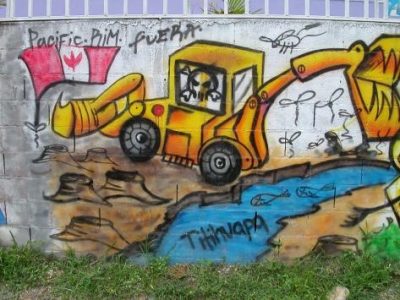A Canadian mining company has cleared a major legal hurdle in their quest to exploit gold in El Salvador. In a celebratory press release, the firm, Pacific Rim, quoted lawyers from two Washington, DC law firms that are representing it in the case.

A mural in El Salvador shows Pacific Rim as a river-killing monster.
Pacific Rim is suing the government of El Salvador, demanding more than $77 million in compensation over the government’s denial of a permit for a gold mining project. The government acted in response to strong public concerns that the project could contaminate a river that is the drinking water source for more than half the country.
The World Bank tribunal hearing the case, in a classic cowardly maneuver, put the word out late Friday that they planned to advance the case past the jurisdictional phase and start hearing arguments about the merits.
The Pacific Rim release quotes one “extremely pleased” lawyer from Weil, Gotshal & Manges and another from Crowell & Moring who called the ruling a “great development.” The continuation of the case makes for more billable hours. According to the Wall Street Journal, lawyers at Weil, Gotshal & Manges make as much as $1,045 per hour. GDP per capita in El Salvador: $3,426.
What’s remarkable is that Pacific Rim was able to hire these two law firms despite having no current income stream. They are essentially a corporate shell whose main asset is a lawsuit on which investors are willing to gamble. So they might lose a few million. But if the legal blackmail works and El Salvador allows the mining project to go ahead, the skyrocketing price of gold will produce a handsome return. Pacific Rim’s release notes that “the Company has received encouraging feedback from potential sources of non-equity financing” to pay for the final phase of the lawsuit.
The response to the tribunal ruling in El Salvador is not so happy. A diverse coalition of faith, environmental, and community groups fought against Pacific Rim’s mining plans because they don’t want their children drinking the poisoned water that often gets left behind when foreign corporations come hunting for gold. Polls show the majority of the country is opposed to the project and two successive Presidents from different parties have been on their side.
So how did this domestic policy issue wind up before an international tribunal? Pacific Rim based its legal claim on alleged violations of two laws — the U.S. trade agreement with Central America and a national Salvadoran investment law adopted in 1999. Both of these allow private foreign investors to bypass domestic courts and bring claims for compensation to international tribunals, such as the International Center for Settlement of Investment Disputes, housed at the World Bank.
The tribunal decided that the company did not have the right to sue under the trade agreement because they are a Canadian company and Canada is not a part of that treaty. But they will hear arguments about whether El Salvador breached its obligations under its domestic laws. It’s not uncommon for cases like this to drag on for years, costing both sides millions of dollars in legal fees.
At a rally in front of Pacific Rim’s Vancouver headquarters on June 2, Salvadoran activist Vidalina Morales asked for international solidarity in demanding that Pacific Rim drop the suit. She said the broad-based coalition that has come together around the issue, the National Roundtable on Metallic Mining, is now even more determined to obtain their ultimate goal, which is a ban on all mining in the country in the environmentally fragile country.
Unfortunately, the international regime for handling investment disputes doesn’t pay much heed to the will of the people.
